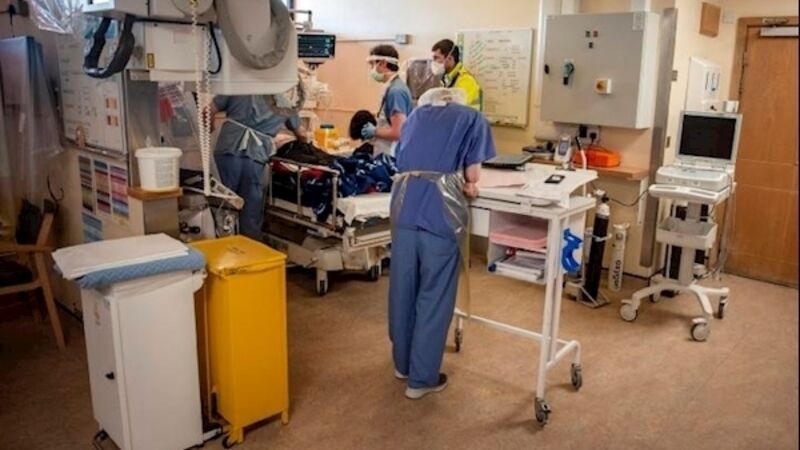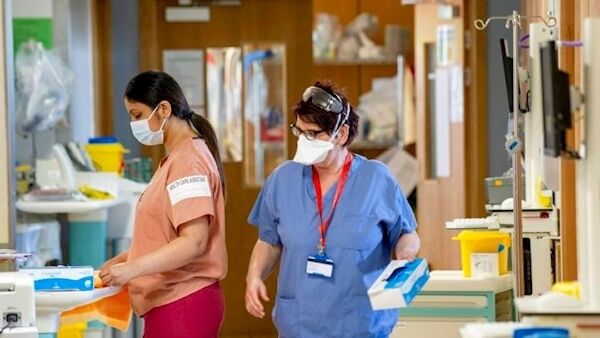ICU nurse at CUH: ‘Hospital is all very strange now’

An intensive care nurse at Cork University Hospital tells what it is like on the frontline of the Covid-19 fight.
Among the things I notice when I arrive for work are two freezer trucks.
They are the temporary mortuaries in case too many patients die.
It isn’t just disturbing to see them, but they are also a brutal reminder of what might be.
Life at the hospital is, as you can imagine, not the same as it was a few months ago.
We are all in full PPE, or some variation of it, every time we see a patient.
That’s a full head-to-toe hazmat suit, which is a bit like a plastic boiler suit.
It is waterproof, it’s splash-proof, but it is also not very breathable so if you can imagine, any period of time inside of it is extremely uncomfortable.
We also have to wear goggles and N95 masks, and on our feet, we have galoshes or wellies.
But the longer you wear the masks, the more your skin starts breaking down and that is quite sore.
You spend a couple of hours in the ICU room or ward at a time.
While in there, we are carrying out full assessments of our patients, monitoring their heart- rate, oxygen levels, blood pressure, giving them medication.
Every time I leave the room, and that could be up to five times-a-day, I have to make sure it’s my turn to go or there is someone available to keep an eye on things while I am gone.
Taking off the PPE can be quite fraught because there is the risk that you have Covid-19 all over you. You need to get all this gear off without contaminating yourself.
Every change out of PPE is an opportunity to get Covid-19 onto our clothes or bodies, so we have to be very, very careful.
When you leave the room, you use the opportunity to eat, to try and rehydrate and to go to the toilet because we are very conscious of not wasting PPE for toilet trips.
But even if we are not working with Covid-19, we have got facemasks on us all the time. This is a huge challenge for communication.
Even with our own colleagues, we are shouting because our voices are muffled.
They and the patients miss out on the non-verbal communications — like the smiles, the laughs.
You can’t as easily tell if somebody is happy or sad when you’re looking at them and that’s a challenge in terms of communication.
I was at home one day at the start of this when I was called by work and informed a patient had tested positive for Covid-19.
I was stunned, sick to my stomach.
Up to that point, the only real information we had about Covid-19 cases related to the idea that people who had travelled abroad might have it.
It caught us off guard because none of us had facemasks on at all when treating the patient.
We just had regular gloves and aprons that we would always use.
A cold shiver came over me and I started crying as I looked at my family around me at home. I was terrified for the patient.
But as I put the phone down and turned to my family, I had this awful dread that I could be positive and could have brought it into the house.
I felt physically sick.
We got through it as a family but like so many other families of ICU nurses, getting through this has only been possible because of family and friends.
You’ve no idea how much we feel so grateful to our brothers, our sisters, our husband, partners, parents, neighbours.
Behind us right now, there are small armies of people without whom we would seriously struggle to do the jobs we do.
It also reminds me of how lucky myself and my colleagues are.
If I wake up with a bit of a sore throat, I wonder, wow, what is that?
If I feel a bit hot, I ask if I am really hot or something else?
Any time one of our colleagues anywhere in the country or the world dies, it plays on our minds.
Our hearts go out to our two colleagues who tragically died in Kilkenny recently.
There for the grace of god go any one of us.
Going back to work after being isolated was very strange.
It felt like being away after a long holiday or illness.
Everybody was on edge, there was lots of building work going on, doors going up, areas being sectioned off, and so forth.
It was a very different physical and mental environment.
Everybody was scared at the time about the dreaded surge.

Thankfully that hasn’t happened, but if we get the numbers the UK is getting, we would all now be working seven-days-a-week, no breaks, flat out.
We have the public to thank for this — for staying at home and for adhering to the guidelines and advice.
That said, I have noticed an increase in the number of cars on the road in recent days.
People who venture out unnecessarily or act irresponsibly need to be aware of something.
If there is a surge and an increase in the spread of infection in the community, the current well-managed top-of-the-range ICU system operating now will be put under even more pressure.
Once the intake goes over a certain threshold, we will be entering disaster management.
We may have the capacity for up to 50 ICU beds but
we don’t have enough experienced and trained ICU nurses to cover all those beds.
And people won’t get the same standard of ICU care they would get under normal circumstances.
I do think the HSE has a lot to answer for.
They have been promising us help with childcare for weeks.
The last quote from them was that they were ready to press the button to provide childcare to us.
A lot of us are really struggling, trying to get childcare.
It is not uncommon for us to do a night shift, come back in the morning, the husband or partner has to work and we take over from them, half asleep, to mind our children.
I don’t think we’re far off breaking point on the childcare issue.
We’re still trying to socially distance ourselves from children in and around the family unit and still pull off 13-hour shifts and overtime working in a highly contagious and at times pressurised environment.
We shower at work when we finish, and we put on our own clothes.
We then go home and most of us are stripping at the front or back doors of our homes, and we shower again.
And childcare isn’t just the issue for us.
Another stark thing about our new working lives hospital at the moment is the lack of visitors.
You are used to squeezing past packed corridors, not just filled with trolleys but of people laughing, families greeting their loved ones.
You could be passing by the open door of a ward and spot out of the corner of your eye an elderly woman standing there about to enter, a smile on her face as she spots her husband in the ward.
Or you could pass by the animated conversation of a school child telling her bed-ridden mother about some latest thing she did in class.
All that has gone. Now, you walk from one end of the hospital to the other at 2pm and it might as well be 2am.
Except for colleagues darting by, or patients on beds being pushed past you in the corridor on their way to another ward or theatre, the place is deserted.
And if there is any Mass going on in the hospital chapel, there is nobody else in there but the priest.
It’s all very strange now.
However, there is a concern now among us all that patients who need hospital care are not coming in for fear of catching Covid-19.
I can only assure them that we are there, willing and able, to care for them.
However, it’s not all bad. The food being donated by the Feed the Heroes people is a real boost.
It lifts our spirits, especially when you realise what you are in the middle of.












